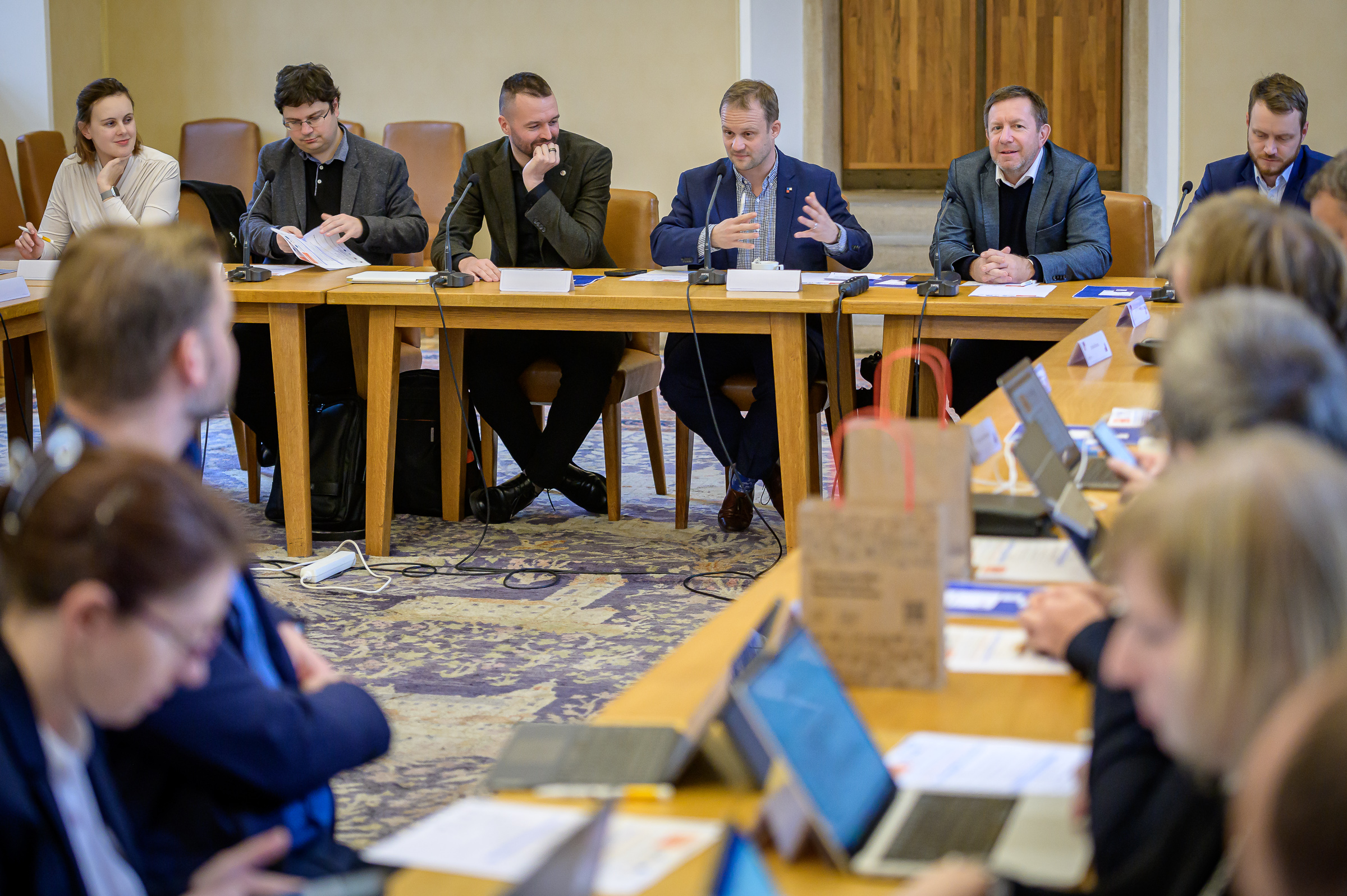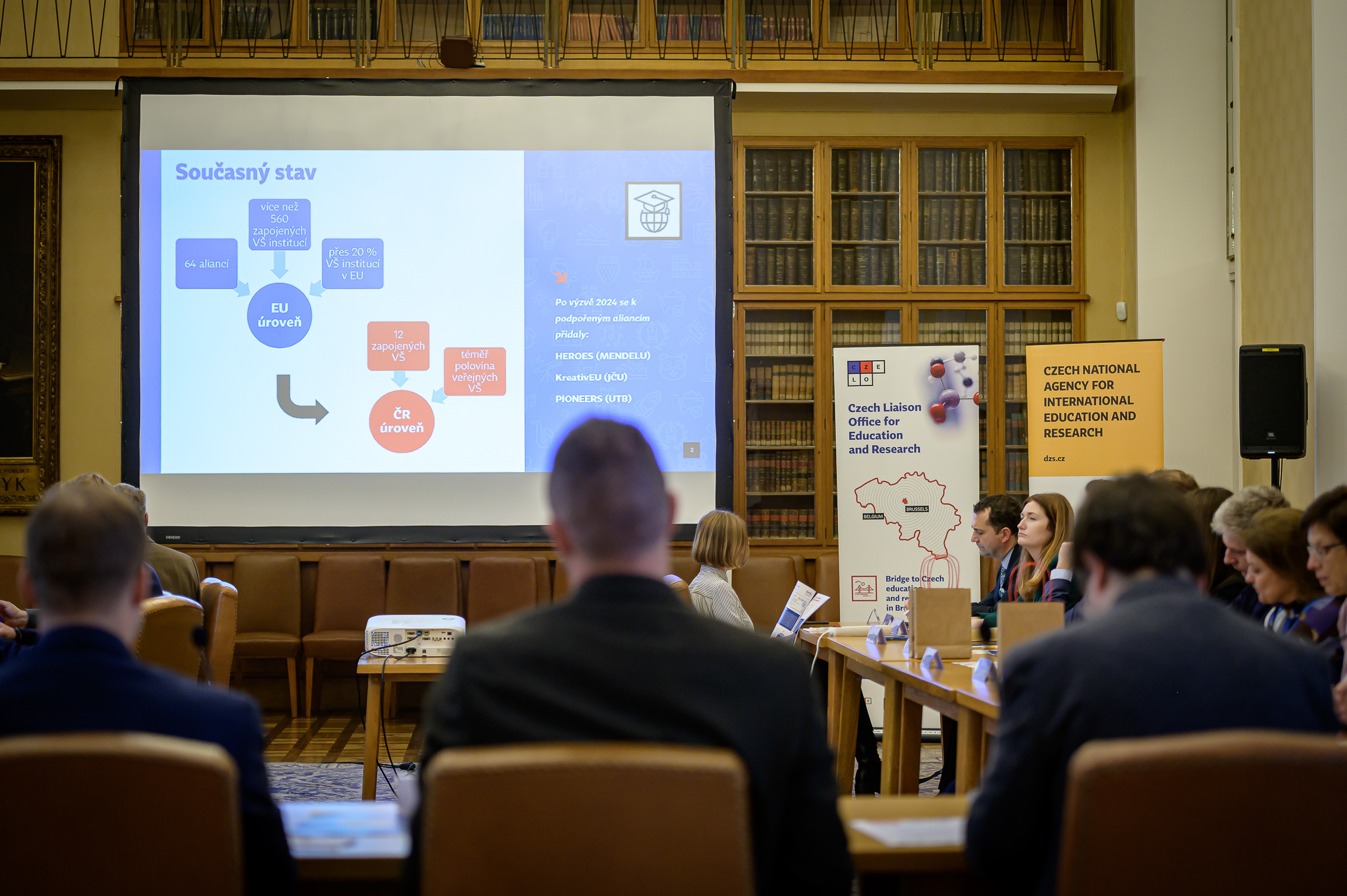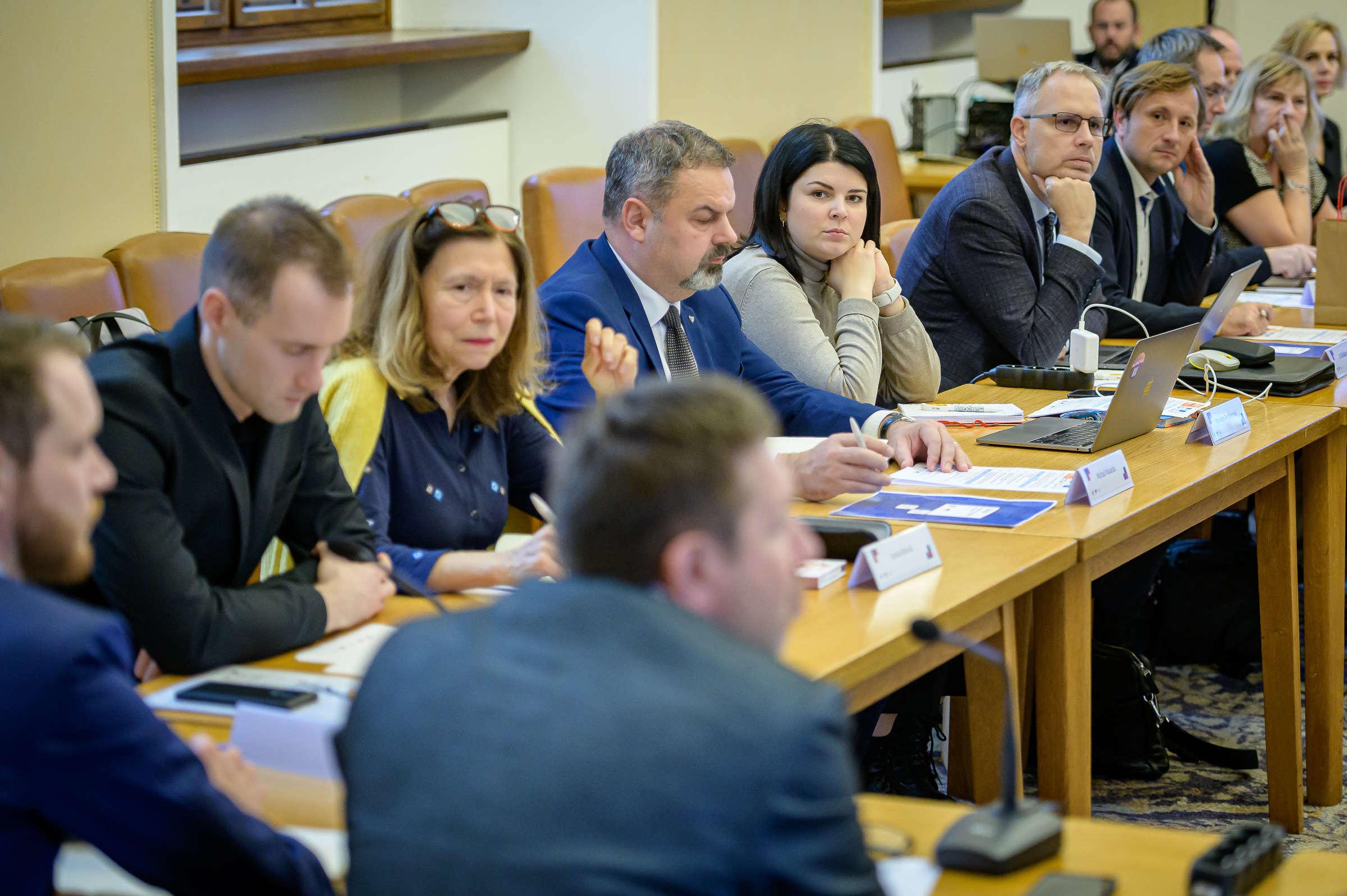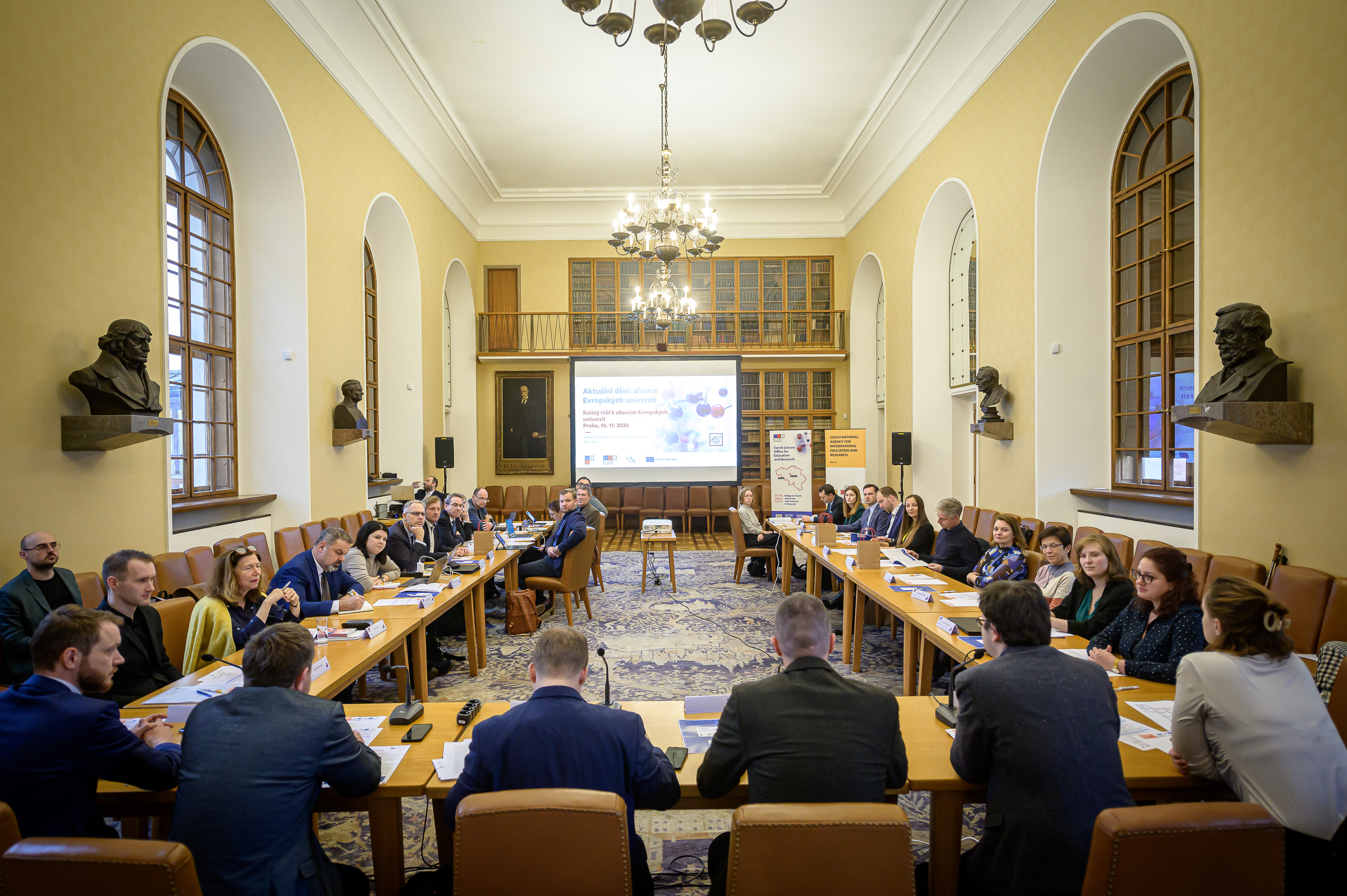What is the role of the Alliances in the future of Europe? Looking back at the fourth round table on European University Alliances
The debate focused on fulfilling all roles of alliances in current and future Europe, the European Degree and alliance management.
On Monday 18 November, we organised our fourth roundtable on European University Alliances as part of the CZEDUCON pre-conference. The round table was attended by representatives of the management of the now 12 Czech universities involved in the supported Alliances, as well as representatives of the Czech National Agency for International Cooperation and Research, the Ministry of Education, Youth and Sports and the National Accreditation Bureau for Higher Education.
The round table is mainly a platform for sharing experiences and good practices among Czech universities involved in this initiative, but it is also an opportunity to discuss current topics related to Alliances. This November's roundtable grew bigger as it included three new universities whose alliances were successful in the 2024 call: the University of South Bohemia in České Budějovice (KreativEU), Mendel University in Brno (HEROES) and Tomas Bata University in Zlín (PIONEER).

Why does Europe need European University Alliances and what role will they play in the future?
At the beginning of the round table, Lenka Procházková, Head of the CZELO Office, presented the current state of alliances at EU level and their role in the priorities of the new European Commission. After the 2024 call, the total number of supported alliances has grown to 64, surpassing the European Commission's original target of 60 alliances. In Czechia, 12 universities are currently involved, representing almost half of the public universities. As for the near future, new European University Alliances should not be supported in this Erasmus+ programming period - the 2026 and 2027 calls will primarily be for follow-up funding of already supported Alliances. In the new programming period from 2028 onwards, calls could potentially be opened for Alliances not yet supported. However, no further details are available yet as the budget for the next programming period will onle be discussed. However, the European Commission has not ruled out this possibility. For the same reason, it is not yet known how the supported Alliances will be funded after 2028. The European Commission is preparing an Investment Pathway to ensure long-term and sustainable funding for Alliances.
In the current European context, it is also worth noting that a new European community of practice of Alliances called FOREU4ALL was launched this autumn and has been financially supported in the 2024 Call for Alliances. The community is intended to not only connect all 64 financially supported Alliances with each other at European level, but also to ensure that the experiences and transferable results of the alliances are shared with the whole European higher education sector. In this way, the European Commission would like to ensure that the alliances also have a positive impact on universities that are not part of an Alliance.
Furthermore, the presentation stated that the European University Alliances are the flagship of the new European Commission in the field of education, research and innovation, in line with its political orientation for the new term. The alliances are thus intended to play a role in attracting talent to Europe by strengthening cooperation between research centres, universities and businesses, and to enhance the transferability of skills through the European Degree. It should be noted that all three major reports that resonated in the Brussels environment in 2024 (the Letta, Draghi and Heitor reports) mention Alliances as key actors for Europe's future. Letta's report calls for the creation of a 'fifth freedom' to strengthen research, innovation and education within the single market. His report sees the Alliances of European Universities as a very important actor, including in piloting the European Degree, which is essential for the fifth freedom. Draghi's report, focusing on Europe's competitiveness, sees the Alliances as a key initiative linking excellence and research. The Heitor report also attributes a crucial role to the Alliances and sees them as a great tool for innovation and piloting new practices in education, research and innovation. In this context, Heitor states that the Alliances have already made significant progress and are a trully pan-European experimental laboratory.
The presentation was followed by a discussion on the above mentioned roles of alliances and the dissemination of the results of alliances with the whole higher education sector, i.e. also with non-participating universities. Most of the alliances have a strategy to disseminate and share their results with other HEIs not involved in the Alliances, mainly through conferences, seminars, newsletters or podcasts, or through bilateral and multilateral cooperation with universities not involved in the Alliances. Linking research, education and innovation, as emphasised in all three strategic reports, is a goal of most alliances, but there are still some limitations, not least because of the separation of these categories even within European programmes. Different grant instruments are used to support education and others for science, research and innovation. However, this could change, for example with the introduction of the new ERC-I (ERC for Institutions) instrument described in the Draghi report.

European Degree: initial interest from alliances, although its concrete form is still under discussion
The next item on the agenda was a presentation on the European Degree, which the European Commission introduced this spring as part of the Higher Education Package. The documents still need to be approved by the Member States in the Council of the EU, and the Council is expected to do so under the upcoming Polish Presidency. So far, the whole concept of the European Degree is only at the beginning, with the Commission planning to adopt the Council Recommendation on the implementation of the European Degree in 2027 and envisaging its implementation across Member States between 2028 and 2030. According to the European Commission, the European Degree should not only make it easier for consortia to deliver joint degree programmes by simplifying the accreditation and legal requirements for joint programmes and joint degrees. It should also increase the attractiveness of European higher education on the global stage through its emphasis on interdisciplinarity and relevance to the labour market. The European Degree should not be issued by a new entity at European level, but by HEIs or possibly by Alliances of European Universities, provided they have the legal status and the necessary accreditation. If Member States decide to implement the European Degree, it should be incorporated into national legislation as a new type of qualification.
The idea is that, for a joint programme delivered by an international consortium and meeting the so-called criteria for European Degree (this would be assessed by an EQAR-registered quality assurance agency), the consortium could award a single diploma to a graduate (and the diploma would not have to meet several national requirements for a joint degree). This diploma could only be awarded on the basis of the criteria for the European Degree, which include quality assurance requirements, including the use of the so-called European Approach to Quality Assurance for Joint Programmes. However, this would require legislative change in all 27 EU Member States, which is very ambitious given that education is a purely national competence. This is why the European Commission is also proposing the possibility of a European Degree Label, which would certify that the joint programme meets the criteria of the European Degree and would only be an accompanying certificate to the "standard" diploma. This would provide a certain of mark of excellence and quality for joint programmes, but would not make accreditation any easier or limit national requirements for joint degrees.
A discussion followed on the topic and the alliances' position on the initiative. Almost half of the Alliances in which Czech universities are involved are already positive about the idea of the European Degree and plan to implement it in the future. Other Alliances are analysing the possibilities or are not yet considering the European Degree, not least because the specific form of the European Degree or its label is not yet known. Regarding the accreditation of joint programmes, all Alliances that have or are planning a joint programme indicated that several parallel national accreditations are necessary. So far, not only Czechia but also most of their partner countries do not allow the so-called European approach, so no Alliance accredits joint degree programmes in this way.
Alliance management and communication: a crucial but long-term task
The last topic discussed was Alliance management and communication, both external (i.e. common identity of Alliances and Alliance promotion) and internal within individual institutions towards academic and administrative staff and students. Participants talked about staff involvement in Alliance activities and project teams and shared best practices on how to communicate the added value of Alliances across the university and engage a broad spectrum of not only staff but also students. Regarding the issue of leadership and management of the alliance, participants pointed out the need to balance between setting up alliance collaboration in a project format (through work packages etc.) and setting up long-term inter-institutional collaboration independent of the funded project. It was agreed that the leadership structures of the Alliance should therefore reflect both project-based leadership within individual work packages and project-based governance bodies such as Executive Boards or Steering Committees, where the chairmanship often rotates, and longer-term and more stable leadership in the form of, for example, the Secretary General of the Alliance. Related to this topic, the discussion also touched on the legal status of alliances under the national law of a country of one of the alliance members, e.g. a coordinator, or a neutral yet strategic country (e.g. Belgium). Some roundtable participants see the legal status of the Alliance as a step towards even deeper cooperation, as it will lead to, for example, a central alliance office that will strengthen the commitment of the partners to the alliance beyond the project.

